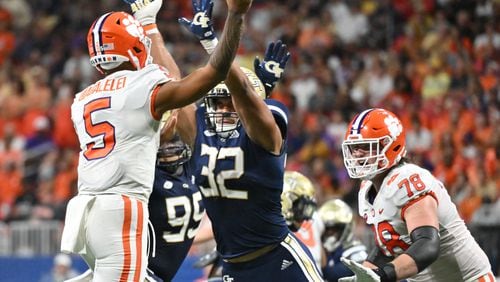The parents of Georgia Tech cornerback Myles Sims, whose request for an immediate-eligibility waiver after transferring from Michigan was denied by the NCAA, believe that they provided more than enough documentation to make clear that their son deserved a waiver.
They also believe that a statement from Michigan regarding his transfer – a required part of the application process for a waiver – included inaccurate information about his reasons for leaving that could have damaged his chances for receiving a waiver.
“The disappointment is in knowing that they included just a few words outside of what we said to mislead the NCAA in their decision-making,” Katrina Sims, Myles’ mother, told the Atlanta Journal-Constitution on Tuesday. “Whether that weighed in heavily or not on the documentation that we provided, we take issue with that.”
A Michigan team spokesman stated that the school, as is the case with all transfers leaving the school seeking waivers, did not oppose Sims’ waiver request and followed standard policy.
Tech has appealed the NCAA’s decision, as well as that of defensive end Antonneous Clayton, whose waiver request was also denied. On his radio show Monday night, Tech coach Geoff Collins said that he and others in the athletic department involved in the waiver request process “wholeheartedly believes that Myles and Antonneous meet the NCAA standards for a waiver to be granted immediate eligibility.”
Sims, a Westlake High grad, submitted his name into the transfer portal in April after redshirting his first season at Michigan and then announced his decision to enroll at Tech in May. Sims’ parents said that when Myles informed Michigan coach Jim Harbaugh in April of his intent to enter the portal, they were both on speakerphone and were a part of the conversation.
They said that they told Harbaugh that they had decided that Myles should transfer and be closer to home for personal reasons and shared nothing more.
“We further expressed gratitude for the opportunity that the coach had afforded our son and we wished him the best going forward,” Katrina said.
However, they said that the statement that Michigan athletic director Warde Manuel submitted to the NCAA as part of the case documentation – Tech’s compliance department showed Myles a copy of it, according to the parents – stated that he had instead left Michigan for a fresh start and for playing time.
The alleged discrepancy could have been costly. Conceivably, a statement from Michigan stating that Sims was transferring to Tech in part because of playing-time issues and not personal reasons – even as it did not stand in the way of Sims’ request – could have weakened the case put forth to the NCAA by Tech’s compliance department.
NCAA guidelines for waivers require that athletes have “documented extenuating, extraordinary and mitigating circumstances outside of the student-athlete’s control that directly impacts the health, safety or well-being of the student-athlete.” Transferring for playing-time reasons would fall outside those circumstances.
Atlanta-based attorney Tom Mars, who has handled the waiver requests for dozens of college athletes, said that if the circumstances were as the Sims family contended, “then I think that would probably have the potential to affect the outcome because it might call into question what really prompted the transfer.”
According to Michigan spokesman David Ablauf, Sims met with Harbaugh and an associate athletic director in April to inform them that he was entering the transfer portal. Notes from the meeting were provided by the associate AD, Sean Magee, to the compliance office, which was responsible for the statement provided to the NCAA. (The Sims contend that Magee was not in the room with their son and Harbaugh.)
Ablauf also said that Harbaugh did not have input into Michigan’s statement to the NCAA. He also pointed out that Harbaugh has been a vocal proponent for changing NCAA legislation to allow football players a one-time waiver to transfer without having to sit out.
Mars, while acknowledging that a discrepancy could affect the outcome of the waiver request, also said that in cases such as this, the standard procedure for the NCAA would be to call Tech “and say, this looks like a discrepancy. Can you explain it?”
Sims’ parents insisted that their son’s case has merit. While they would not disclose specifics of the personal reasons that led him to transfer closer to home, they said that they submitted documentation to the NCAA from doctors supportive of their case.
“That’s why we’re so upset, because we exceeded what (the NCAA) wanted from us,” Myles’ father Merrick Sims said. “Because they asked us for the documentation and we gave them the legitimate documentation.”
If Sims’ appeal is approved, he will have four years of eligibility starting this season. Otherwise, he will sit out this season and have three years to play beginning in 2020.
About the Author






